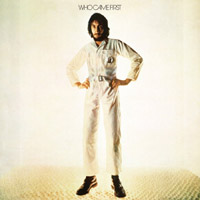From Universal’s treasure trove of treats comes no less than 12 remastered solo CDs from Pete Townshend. Anyone who doubts the creative powers of the Who leader need look no further than this sprite catalogue, beginning with his solo debut from 1972, Who Came First right up to 1993’s conceptual mini opera Psychoderelict. Mixing in his own personal ordeals with a host of odd and quirky characters and scenarios, Townshend was able to pursue a sense of artistic freedom and finesse without the infringing bombast of the Who. And while he has effectively returned to the front lines with Roger Daltrey in a fiery determination to prove the Who are still a viable and functional unit, his solo work encompasses a full body of inspiring and masterful work outside the madness of the Terrible Two.
Who Came First is a low-key tribute to his spiritual leader Meher Baba, a transcendental and meditative showcase of Townshend’s songwriting prowess. Sprinkled among the soothing “Parvardigar,” taken from a prayer, and simple odes like “Sleeping Dog,” are stripped-down versions of Who classics — “Pure And Easy,” “Let’s See Action,” and “The Seeker.” It would be another five years before Townshend would venture away from the Who to collaborate with Faces bassist Ronnie Lane on Rough Mix. A hodgepodge affair that’s aged well in ensuing years, Townshend and Lane invited heavyweights like Eric Clapton and Charlie Watts to stir up a concoction of country, New Orleans and classic rock styles. The reissue is remixed in 5.1 surround and re-released as a Dual Disc. The DVD portion of the two-sided disc includes photos from the sessions, as well as filmed interviews with Townshend, Lane’s manager, and producer Glyn Johns. This is a must-have for all Townshend/Who freaks.
Three years later, Townshend returned with 1980’s Empty Glass, overflowing with enduring pop-flavored exuberance and hit singles, like the Top 5 “Let My Love Open the Door,” and “Rough Boys,” a personal paean to the emerging punks and their seedier lease on life. Two years later, All The Best Cowboys Have Chinese Eyes arrived, boasting a batch of songs that could or could not have been done by the Who, depending on who you’re asking. Despite an immersion of modern, slick instrumentation, tunes like “The Sea Refuses No River” and “Slit Skirts” stand up to the best of what the singer-songwriter-guitarist could offer. Clearly, Townshend, with the Who officially retired at this point, was facing an uphill battle in proving his validity and self-worth in a changing musical climate.
His next three solo efforts were strong in spots, yet mired in epic ambition that failed to match the intensity and breadth of Tommy or Quadrophenia. Starting with 1985’s White City, a “novel” wrapped around the plight of urban life, Townshend dredged up “Face To Face” and “Give Blood,” arguably the album’s only decent cuts. The follow-up? How about The Iron Man, a “Musical” based on a children’s fable written by the British poet Ted Hughes, with Daltrey, Nina Simone, and John Lee Hooker cast as assorted, sundry characters to help make sense of the whole sordid tale. The one redeeming factor about The Iron Man is that it coincided with the Who’s 25th Anniversary Tour, which, in many ways, reflected the album’s circus-like entrance onto the airwaves. Fans who flocked to the Broadway-style production (a debatable low point in the Who’s storied history) may remember “Dig,” the Who-like anthem with Daltrey in full Who-like stride and possibly the record’s single high point. It would be another four years before the psychosis of Psychedelic, a well intentioned story with long-winded dramatizations inserted between the songs. That move alone reportedly garnered numerous complaints from various Townshend factions worldwide.
While spinning a web of searing yarns to be analyzed, Townsend took great care in revealing the process in which he operates, sumptuously represented by the Scoop series — Scoop, Another Scoop, and Scoop 3 — at two discs each. Townsend’s creative juices glow in a glaringly extensive look at the underside of his recording hijinks. However which way this material was remastered (remastering outtakes, demos and home recordings is an incongruous act of defiance) you’ll appreciate the extra liner notes and packaging, especially if you’re a diehard completist who cares about such things. Yeah, you can toss in “Magic Bus” and “Happy Jack” playing tag with more obscure tinkerings like “Goin’ Fishin’” and “Baroque Ippanese,” and come away with the notion that Pete Townshend was never one to fritter his time away when he was at home and isolated from the Who.
Rounding out the reissue lineup is Pete Townshend’s Deep End Live!, which dutifully mixes the somewhat new (“After The Fire” and “A Little Is Enough”) with the comparatively old (“I’m One” and “Pinball Wizard”). Townshend, with a hot band in his corner, is able to interpret and reinterpret his music without the fuss and muss of Daltrey and John Entwistle in his wake, which, at times, provides a refreshing take on familiar stylings. In their remastered, repackaged, and essentially reassessed format, each release from the Townshend canon recounts a step forward, backwards and sideways in a career that’s still angling for position and respect, whether you like it or not. Long live rock!
~Shawn Perry




















